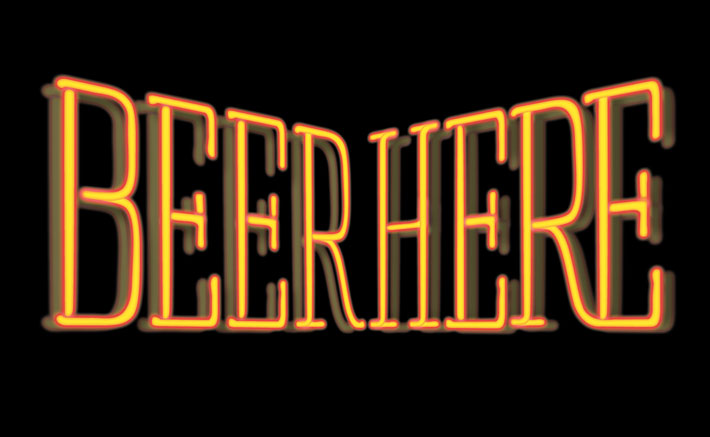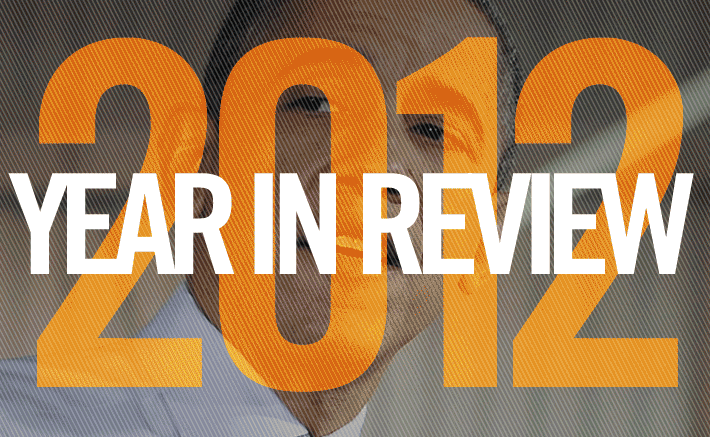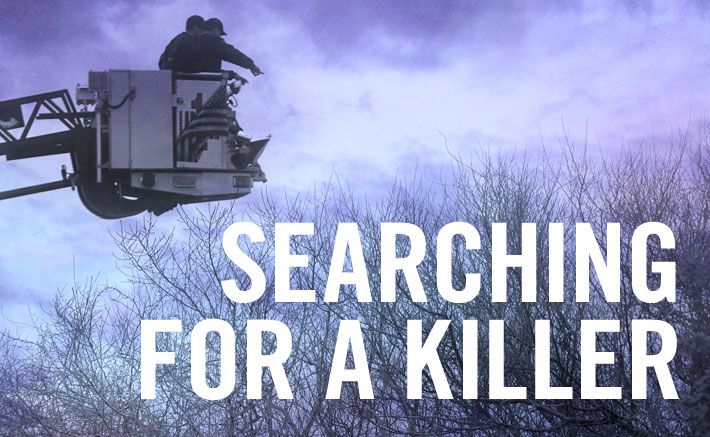

BEER RUN: The Greenport Harbor Brewing Co., calls the former village firehouse home. Center: The second-floor tasting room, where artists’ work is tastefully displayed. Right: The GHBC delivery truck appears to carry one big pint of beer at a time.
HOPPY HOUR
Like rapid expansions in other industries, the craft beer boom hit a few bumps in the road this year. But state lawmakers in Albany eager to take credit for any positive economic news didn’t pass up a sweet opportunity to help foster a legitimate growth spurt.
After a court ruling in March significantly spiked state taxes on craft brewers, lawmakers cooked up a tax credit to offset the increased cost of doing business. They also passed laws exempting small breweries from annual labeling fees as well as creating a farm brewery license to encourage local brewers to use more locally grown hops and barley.
“In addition to producing some of the finest beer in the world, New York’s craft breweries are creating jobs, supporting our state’s farmers and hops growers, as well as bringing in tourism dollars in local communities across New York,” Gov. Andrew Cuomo said last month after signing the legislation into law.
New York brewers that produce 60 million gallons or less annually will be eligible for a tax credit worth 14 cents per gallon for the first 500,000 gallons and 4.5 cents per gallon for 15 million and above. That’s to make up for a microbrewery excise tax exemption that a Massachusetts-based beer company successfully sued to overturn.
“It is critically important to do everything in our power to help New York’s craft brewers succeed,” said state Sen. Lee Zeldin (R-Shirley), who sponsored the tax credit.
For up-and-comers such as Barrier Brewing Co. in Oceanside, where partners Evan Klein and Craig Frymark pride themselves on “brewing for quality not quantity” with small batches of dozens of different beers, the $150 annual brand label fees for each creation reportedly added up to a $6,000 bill from the state Liquor Authority.
That’s a hefty cost for a little, three-year-old startup. Even one that draws a steady line of patrons snaking through their newly quintupled production facility each Saturday—the only day of the week when the public can come in to refill their growlers, the 64-oz. jugs sold to go in craft breweries.
Although they are currently the only brewery in Nassau County, the Barrier boys too could build on the successes of East End farm wineries. Modeled after the 1976 law that planted the seed for wine country, farm breweries are allowed to open restaurants on the premises, sell locally made wine and spirits as well as related merchandise—among other benefits.
Under the law, farm breweries would be required to use at least 20 percent local hops and ingredients in the next seven years, no less than 60 percent by the end of 2023 and 90 percent or more in the following years. LI breweries, many of which reside in industrial parks, would not necessarily have to grow their own ingredients to qualify.
“The farm brewery legislation is going to now kick off another growth area in farming because it really asks farmers to grow hops and barley in New York State,” says Katleski, the state brewers’ association head. “We’re going to start seeing 100-percent New York State-made beers with New York State-grown ingredients, which is a rarity these days.”
BREWS BROTHERS
For all the good news, there is still no shortage of red tape, growing pains and unintended consequences—some predictable, some not—that come with getting into the alcohol business.
Riverhead homeowners reportedly gave a chilly reception for a proposal to convert an abandoned century-old schoolhouse on rural Sound Avenue into a microbrewery. Great South Bay Brewing Co. recently moved four miles across town in Bay Shore after their first locale was snared in a landlord and permitting snafu. Not to mention the investment—$250,000 to $1 million, depending whom you ask—to set up a typical shop while waiting at least a year to get a state microbrewery license.
“It’s gonna take some time before the fruits of my labor are shown,” says Michael Philbrick, 36, who opened Port Jeff Brewing Co. last fall in the heart of the village’s downtown. “It was like playing guitar and dreaming of being a rockstar.”
The former home-improvement company salesman credits his wife with crystallizing the idea and gifting him his first home-brewing kit for the holidays, a “horrid” Christmas beer that he choked down a decade ago. It turned into the (better tasting) gift that keeps giving. His nautical-themed brewing operation, established in what was previously a Christmas store, is now on taps Island-wide and sees brisk tasting-room business.

FILL 'ER UP: Michael Philbrick, founder of Port Jeff Brewing Co., samples some of his flagship beer, Schooner Ale, which recently won the Silver medal in the U.S. Open Beer Competition for English Pale Ale
Getting to that point isn’t for the faint of heart. Greg Martin, who with partner Ed Burke, debuted Long Ireland Beer Co. in Riverhead last summer, once saw his salesman kicked out of a bar. His employee drew the bar owners’ ire for asking to not have his beer replace one made by local forefathers Patchogue-based Blue Point Brewery on the tap—valuable real estate in the bar business.
“He had said, ‘Well, is there maybe a different beer you’d consider taking off? We know those guys, they’re local guys, we’re friends,’” the 40-year-old Shoreham resident recalls.
The owner yelled back: “If you’re not willing to take Blue Point’s lines and be competitive, then you’re not gonna make it in this business!”
Martin recalls that patrons of that bar kept asking for Long Ireland, a name that came to him in a St. Patrick’s Day hangover shower, and a year later they recovered the sale—without bumping off Blue Point.
“One of the things we say about brewing is it’s 99-percent asshole-free, and I don’t wanna be that one percent,” Mark Burford, who co-founded Blue Point in 1997, told the Press in an interview this spring. Martin cites Burford’s idiom while recapping the bar dispute.
Don Sullivan, owner of Southampton Ales And Lagers—which predates Blue Point by a year as LI’s oldest brewery and is the only local brew pub that also distributes to stores—is optimistic the rising tide of beer isn’t a repeat of the brewery bubble he saw in the ‘90s.
“You share most of the same challenges,” Sullivan says while juggling the blinding pace of running a pub in the Hamptons in August. His advice to newcomers? “Don’t assume anything. Once you start to assume things, you get thrown a curve… Some are fun and some are not what you’re expecting.”
Take it from Steve Pominski of Merrick, a former Entenmann’s employee and current transit worker wading into his third career as a beer man. He was about to open Barrage Brewing Co. in Freeport two years ago before being forced to scout a new spot in Farmingdale. He’s aiming to launch by year’s end.
“Once that fell through, it was kind of like starting from scratch,” says Pominski, who’s 50, same as Sullivan and Burford—someone he’s known from their younger days when professional brewing was just a dream they plotted over imported beers.
“A lot of the newer guys that are looking to open up breweries really don’t understand what’s entailed until you actually talk to a lot of brewers that have opened, all the pitfalls and the little things that don’t make it as wonderful as you think it might be,” he says with a sigh. “All the paperwork in the background that you don’t even think about that can easily dissuade someone—unless you got a passion.”
Pominski’s inspiration came about four years ago when he built a homemade bar in his garage—get it? Barrage!—threw a grand opening party and served his home-brewed beer to celebrate. Revelers insisted he sell his concoction.
Having to move before even opening is one thing. Rick Sobotka, an anesthesiologist and fourth-generation brewer, had opened his Great South Bay Brewery tasting room last winter but had to close it and move this summer before the brewing operation could launch.
“Anesthesia is a career I really enjoy,” Rick says on his website. “But I always knew one day I would start my own brewery.”
For all his planning, he couldn’t have anticipated having to relocate before settling into his first choice. Still, he and his team take it all in stride.
“If all keeps going in the direction that it’s going at the current moment, everything should be up and running sooner than later,” says Phil Ebel, GSBB’s chief operations officer, who estimates the new digs will debut within three to six months.
Some might say Barrage and GSBB were lucky to make it that far along. Bert Fernandez, 33, who co-founded Fire Island Beer Co. in 2009 with his brother, Tom, and cousin, Jeff Glassman, has yet to find a home.
“It’s kinda hard to find the time to actively go out there and scout sites this time of the year, so we’re going to revisit that into the fall and the winter,” says Fernandez, who expects to soon roll out a lager—a rarity among local brewers given the extra fermentation time compared to ales. “We’re hoping that within the next year we’ve got a location scouted out.”
Of course, some problems are blessings in disguise.
“Right now we can’t even keep up with demand,” says Larry Goldstein, a 44-year-old chiropractor who is set to open this fall the tasting room to Holbrook-based Spider Bite Brewing Co., which he co-founded with his mortician neighbor, Anthony LiCausi. “We’re always playing catch-up.”
And, yes, Goldstein was actually bit by a spider, hence the name.
CHEERS FOR LOCAL BEERS
With so much brewing, the local craft beer scene now has tangential businesses capitalizing on the increased interest from consumers—forcing established local brewers to increase capacity to keep up.
Beer-pairing dinner events are now commonplace at many craft beer bars across LI. Three annual beer festivals recently saw competition from a fourth—Beer Fields, featuring dub-rockers Sublime with Rome at the Brookhaven Amphitheater on Sept. 8. At least one local limousine company has added brewery tours to their winery-tour packages.
“I think there’s a critical mass of beer bars on Long Island now that are willing to and want to stock homegrown beers,” says Kilkelly, the beer journalist. “If the beer’s good, the people will come.”
Arguably the most anticipated perennial event is The North Fork Craft Beer, BBQ & Wine Festival, which hits Martha Clara Vineyard in Jamesport on Aug. 11. And it’s fitting that the beer biz would join forces with those who blazed the wine trail, considering the overlap.
“It’s definitely starting to kick,” says Mike Weiss, CEO of Metro Limousine Service, which expanded from winery to brewery tours three years ago and now serves about a half dozen beer groups monthly.
Stops can also include brew pubs like Brickhouse Brewery in Patchogue, German-owned Black Forest Brew Haus in Farmingdale and Mass.-based John Harvard’s Brew House in Lake Grove.
Greenport Harbor Brewing Co., established in an old firehouse at the heart of wine country in 2009 at the beginning of the new wave, will be toasting buying a second location this summer—just as all the friendly competition rolls into town. It should be no surprise that they were way ahead of the curve on the farm brewery idea.
“It’s kinda like the wineries the more it becomes a part of our local character and culture,” says Richard Vandenburgh, 49, a real estate attorney who co-founded the brewery with his partner, John Liegey.
They bought a new 3-acre parcel in nearby Peconic, where they plan to build a larger brewing operation including bottling, a brew pub and beer garden while maintaining their original location. One of their employees is already growing hops on 1/3 acre of his family farm, although Vandenburgh urges patience for those looking for a beer made from all LI-grown ingredients.
“It’s gonna be a while before it reaches a point of sustainability for local breweries to be able to rely on what’s grown locally,” he says.
Paul Dlugokencky, founder of self-depreciatively titled Blind Bat Brewery—he’s colorblind and near-sighted—in the garage outide his Centerport home in 2008, is also shopping around for a farm brewery headquarters. As the husband of an organic farmer, he sees the potential, too.
“The more different brewers we have, the more different beers, the better for everybody,” the 52-year-old publishing industry professional says while hawking his brews at the Babylon farmers’ market on a recent Sunday.
“Craft beer people like variety,” he says. “I think there’s room for everybody.”






